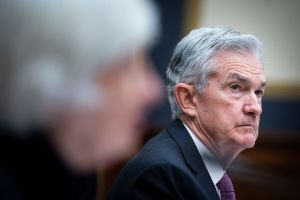
Fears surrounding a new, heavily mutated variant of Covid-19 rocked markets Friday, causing a selloff in stocks and drop bond yields.
The new variant has the potential to impact monetary policy, and traders are adjusting their bets accordingly.
A fall in short-dated bond yields, like the two-year and five-year Treasury notes, which are more sensitive to changes in more immediate policy, were indicating that investors expect the Federal Reserve to hold off on raising interest rates.
The yield on the two-year note was hovering around 0.5% Friday after closing at 0.61% Wednesday, while the yield on the five-year note was down to 1.22% from 1.35% Wednesday.
Markets have generally expected the first interest rate hike from the Fed in June, when traders predict there is 69% of the central bank raising rates, according to the CME’s FedWatch Tool, which is based on changes to Federal Funds futures.
But traders scrambled to push back the timing of the Fed’s first 25-basis-point rate increase to September, and briefly priced out any more hikes until 2023,, according to data reported by Bloomberg Friday.
Neil Wilson, an analyst at broker Markets.com, noted that the variant “could also stop the Fed from potentially increasing the rate at which it tapers QE.” The Fed began slowing, or tapering, its pandemic-era quantitative easing program this month, and has indicated that it could speed up the pace of its taper based on economic conditions including inflation and the labour market.

